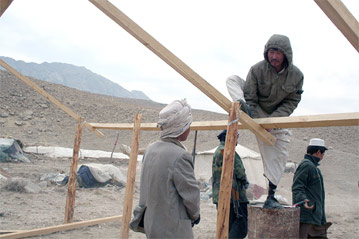UNHCR battles cold front in northern Pakistan
UNHCR battles cold front in northern Pakistan

SIRAN VALLEY, Pakistan, Jan. 17 (UNHCR) - As a new wave of rain and snow hits northern Pakistan, the UN refugee agency has started the second phase of its winterization drive by distributing heaters and kerosene to help people stay warm in relief camps.
The rain started early Sunday and is expected to continue for eight to 10 days. New snow has fallen in the higher elevations, and in areas like Batagram (1,100 metres above sea level), temperatures have dipped to minus 4 degrees Celsius at night.
Over the weekend, staff of UNHCR and its implementing partner BEST trudged through muddy fields to distribute heating stoves and kerosene to 207 families in two camps in Siran Valley near Mansehra.
"This new heater is a life saver," said Mohammad Ibrar, chairman of the social welfare committee at New Bhogarmang camp, as he huddled with his family around the heater donated by World Vision.
Families in nearby Old Bhogarmang camp also received heaters and kerosene. UNHCR plans to complete this phase of winterization in Siran Valley's eight camps this week, supplementing earlier distributions of tents, blankets, plastic sheets and mattresses to fight the cold.
The issue of safe heating has been under discussion for many weeks now. Morgan Morris, UNHCR 's team leader in Muzaffarabad, explained the conundrum: "If we do not put heating in the tents, many small children and vulnerable people could die from the cold. However, if we put stoves inside the tents, there is the risk of fires which could spread to other tents in congested camps."
Weighing the risk of hypothermia against tent fires, the Pakistan authorities and UNHCR have reached an agreement: to set up fire-fighting stops in each camp, provide training to prevent fires and equipment to put them out if they occur. Leaflets on fire safety and prevention have been distributed, reaching from Siran Valley to Jehlum Valley in Pakistan-administered Kashmir. In parts of North-West Frontier Province, community fire safety teams have also been set up to advice camp dwellers on the appropriate use of heaters and what to do should a fire break out.
"Most of them already know how to manage fire - they cook with fire and use it for heating," said Markus Lampus, a logistics officer from German NGO Technisches Hilfswerk (THW) who is training the fire-fighting squad in New Bhogarmang camp. "Today's training emphasized specific points about using kerosene and ensuring that children are also included in fire and kerosene safety awareness."
He stressed that it was important to circulate air in the tent when using kerosene and that jerry cans containing the fuel should not be reused for other purposes, especially for water. "You should never use water to fight a fire caused by kerosene," he added. "The water will just spread the kerosene and fire. Instead, use sand or a fire extinguisher."
In New Bhogarmang, the squad is headed by Mohammed Arshad, a Pakistan army veteran with a lot of experience in fighting fire. "When it comes to fire prevention, the most basic and important thing is that the families take care where they place the heater and ensure that children are kept away from it," he said. "If there is a fire, we'll use our experience with sand and clay to put out the fire. We can also use fire extinguishers provided by THW/UNHCR, which are particularly useful if the fire is dispersed."

Each fire-fighting squad is equipped with a bucket for sand, a fire extinguisher and a large fire beater. Fire safety training is also conducted on an individual family basis to fully sensitize the camp population.
Similar stove distributions and fire safety training are taking place this week in 144 camps hosting some 140,000 people in the quake zone, including in Abbottabad, Mansehra, Balakot, Batagram, Bagh and Muzaffarabad. UNHCR has set aside 40,000 stoves for heating, and will continue to provide kerosene throughout the winter.
By Ariane Rummery in Siran Valley, Pakistan
with inputs from Maria Cierna in Muzaffarabad








